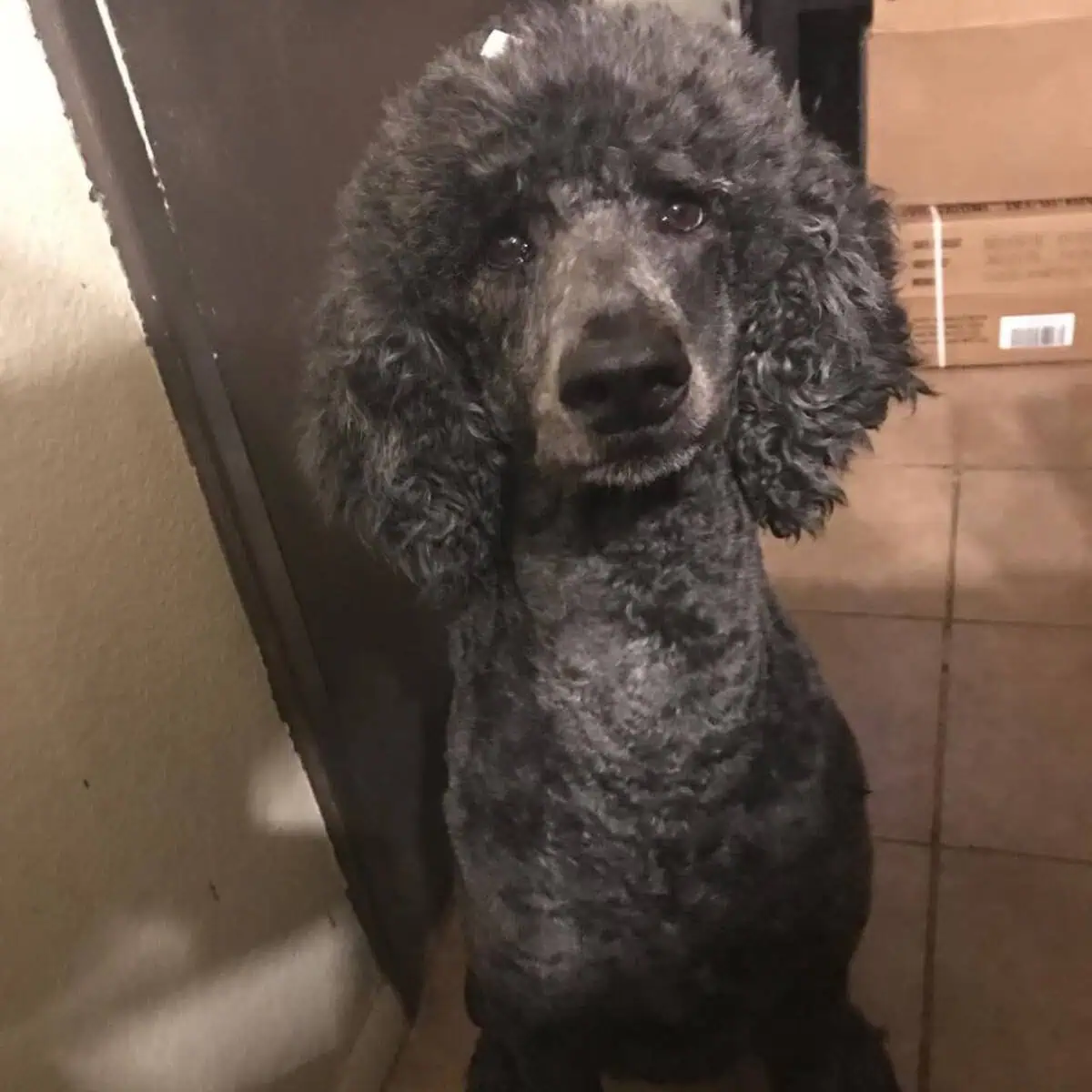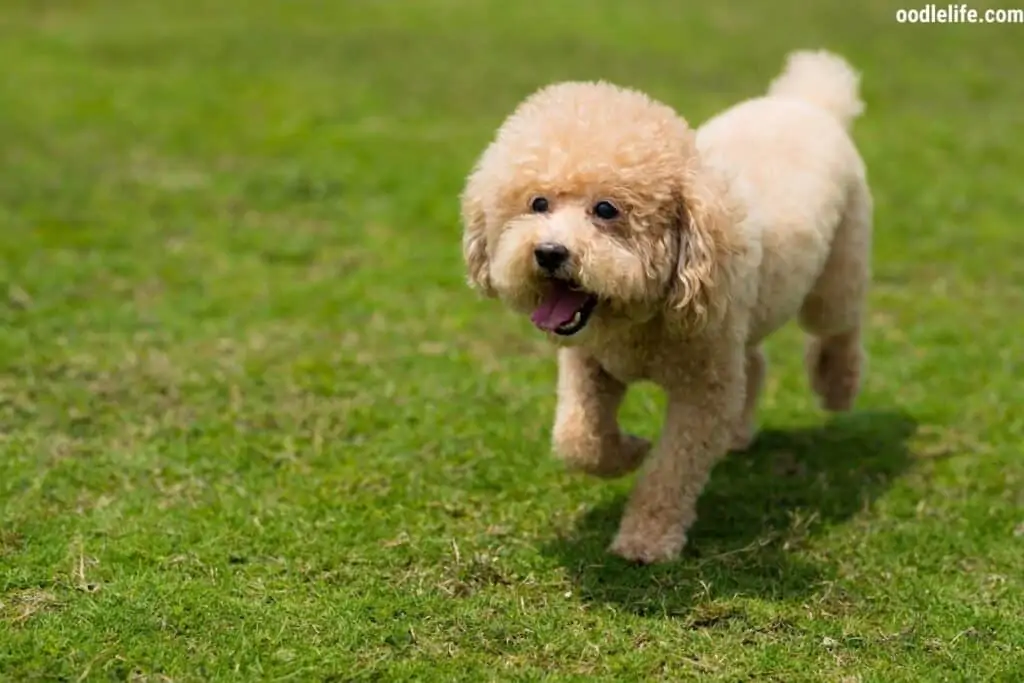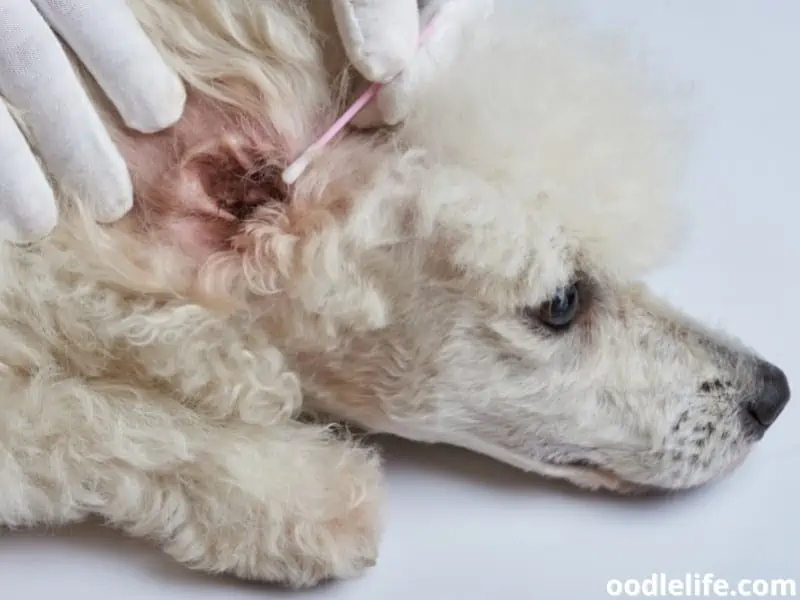Why Do Poodles Shake? [5 Reasons]
You love your Poodle, so you’re understandably concerned when you notice them shaking.
In some cases, shaking in Poodles is relatively harmless. Other times, your Poodle might shake for medical reasons, requiring a trip to the vet.

This article will help you understand why Poodles shake and help you get to the bottom of this hopefully temporary event in your Poodle’s life.
Reasons Why Poodles Shake
Below are some of the most common reasons why Poodles shake. Should you have a Poodle that only shakes their head, scroll down to the bottom of this post for other possible reasons.
1. They’re Cold
Like humans, Poodles shiver when they’re cold. And given that Poodles range from toy to standard sizes, a temperature that might be shake-worthy for one Poodle might not be so for another.
Scientists are still debating the way that cold may impact your Poodle. It follows the logic that smaller Poodles will get cold faster since they have a larger surface area relative to their volume. But research also suggests that a smaller dog’s faster metabolism will cause them to stay warmer than Standard Poodles.
In either case, you’ll be able to tell if your Poodle is shaking because they’re cold if they try to cuddle up to blankets or a heater. If you see them do this, turn up the heat in your house and wrap them in your arms.

2. They’re Scared
Fear can make a Poodle shake. According to the American Kennel Club, some of the most common situations that can scare dogs include:
- Thunderstorms
- Fireworks
- Gunshots
- Veterinary visits
- New dogs or people
Luckily, most of these situations are temporary. So, soothing your Poodle until their fear subsides is often the most suitable route.
However, you also might want to work with your Poodle on desensitization, particularly if they shake when meeting new people or dogs. A certified dog trainer can give you tools for helping your Poodle to overcome their fear.

3. They Have Anxiety
Poodles love their humans, which is a wonderful feeling for owners—except when they need to leave their dog. Because of a Poodle’s loyalty to people, they often struggle with separation anxiety when their human leaves. In some cases, all it takes is a trip to the shower.
So, if you notice that your Poodle shakes whenever you walk back into a room or after being away from your home, you’ve likely got a case of separation anxiety on your hands.
To help your dog overcome their anxiety, don’t make a big deal of your arrival and departure. Furthermore, give them a special treat whenever you leave and work with a trainer if your Poodle isn’t improving.

4. They Have Low Blood Sugar
Shaking is a symptom of hypoglycemia, which is low blood sugar. Hypoglycemia can happen for several reasons, including:
- Cold environment
- Internal parasites
- Nutrient deficiency
So, if you just found a Poodle on the side of the street, their shaking could be the result of low blood sugar from one or more of these issues.
In addition to shaking, your Poodle may also display other symptoms, such as:
- Lack of coordination
- Weakness
- Lethargy
- Loss of appetite
If you suspect that your Poodle has low blood sugar, bring them to the vet immediately. There, your dog will likely receive a glucose injection.

5. They’re Having a Seizure
If your Poodle is violently shaking, they might be having a seizure, so you should get them veterinary attention right away.
In some cases, seizures are a hereditary trait in Poodles. However, other non-genetic reasons why your Poodle might be having a seizure include:
- Kidney failure
- Brain tumor
- Liver disease
- Ingestion of a toxin
When you take your Poodle to the vet for a seizure, they’ll check for several items using tests. Often, they’ll run a CAT scan or MRI and test for heartworm. They’ll also offer your Poodle anticonvulsant medicine to help stop the seizure.
The success of the treatment will depend on how far along the seizure is. If you’re able to bring your Poodle to the vet early enough, they’ll likely be able to continue living a high-quality life.

6. They Have White Shaker Dog Syndrome
White Shaker Dog Syndrome is a condition that occurs in small, white dogs more than other coat colors and dog sizes. As a result, Toy and Miniature Poodles have a statistically higher chance of coming down with this condition than the Standard Poodle.
Shaker Syndrome causes dogs to shake because of full or partial-body muscle tremors.
No one knows the cause of this syndrome. Furthermore, it typically develops in dogs when they reach one or two years old.
You may notice your dog shaking more under the following circumstances:
- Excitement
- Exercise
Sometimes, your Poodle’s shaking may subside or go away altogether when they’re sleeping.
The good news is that many Poodles can live with Shaker Syndrome, as it doesn’t impact most of their functions. However, your veterinarian can prescribe you prednisone to help control your dog’s shaking.

Reasons Why Your Poodle Shakes Their Head
If your Poodle is only shaking their head, it’s possible that it could be because of one of the reasons above. However, more likely than not, it’s a more localized issue.

Reasons that your Poodle might be shaking their head include:
- Ear infection
- Mites
- Fleas
- Inflammed ear canal
- Idiopathic head tremors
Of these issues, ear infections are a breed-specific issue in Poodles. That’s because their floppy ears make it harder for air to get into their ear canal. Add to this that Poodles love to swim, and bacteria have a perfect breeding ground.

Getting to the Bottom of Your Poodle’s Shaking
Poodles shake for a reason, so you should never reprimand them for it.
Instead, use the information here as a guide as to why your Poodle may be cold. Should you be on the fence about whether your Poodle has a medical condition, it’s always best to bring them to the veterinarian. With a little care, your Poodle will hopefully soon stop their shaking.